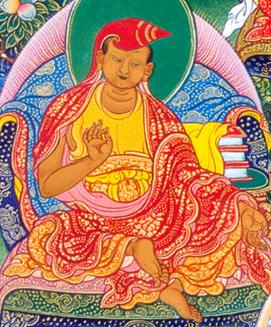Bhavaviveka: Difference between revisions
mNo edit summary |
|||
| Line 4: | Line 4: | ||
==Writings== | ==Writings== | ||
*''[[Heart of the Middle Way]]'' and its auto-commentary, ''[[Blaze of Reason]]'' (Skt. ''Tarkajvāla'') | *''[[Heart of the Middle Way]]'' and its auto-commentary, ''[[Blaze of Reason]]'' (Skt. ''Tarkajvāla'') | ||
* '' | * ''Madhyamakārthasaṃgraha'' | ||
* ''Prajñāpradīpa'' | * ''Prajñāpradīpa'', a commentary on the [[Root Verses of the Wisdom of the Middle Way]] | ||
* *''Karatalaratna'' (only available in Chinese) | |||
* ''Madhyamaka-ratna-pradīpa'' | |||
==[[Quotations: Indian Masters#Bhāvaviveka|Quotations]]== | ==[[Quotations: Indian Masters#Bhāvaviveka|Quotations]]== | ||
Revision as of 09:09, 2 September 2021

Bhavaviveka (Skt. Bhāvaviveka; Tib. ལེགས་ལྡན་འབྱེད་, lekden jé, Wyl. legs ldan 'byed), aka Bhaviveka (Bhāviveka; སྣང་བྲལ་, snang bral) or Bhavya (སྐལ་ལྡན་, kalden, skal ldan) (c.500-570), was a sixth century master of the Svatantrika school of Madhyamika. He was critical of Buddhapalita’s interpretation of Nagarjuna’s classic work The Root Verses on the Wisdom of the Middle Way, because he believed Buddhapalita should have put forward independent logical arguments, rather than simply pointing out the flaws in others’ positions. The great master Chandrakirti later defended Buddhapalita’s approach and sought to refute Bhavaviveka.
Writings
- Heart of the Middle Way and its auto-commentary, Blaze of Reason (Skt. Tarkajvāla)
- Madhyamakārthasaṃgraha
- Prajñāpradīpa, a commentary on the Root Verses of the Wisdom of the Middle Way
- *Karatalaratna (only available in Chinese)
- Madhyamaka-ratna-pradīpa
Quotations
མེད་པར་ཡང་དག་ཁང་ཆེན་གྱི། །
སྟེང་དུ་འགྲོ་བར་བྱ་བ་ནི། །
Trying to reach the great mansion
Of the authentic nature of reality
Without the steps of the authentic relative
Is not an approach the wise should take.[1]
- Bhāvaviveka, Heart of the Middle Way, III, 12
Further Reading
- David Seyfort Ruegg, The Literature of the Madhyamaka School of Philosophy in India, Wiesbaden: Harrassowitz, 1981
- David Seyfort Ruegg, 'On the Authorship of Some Works Ascribed to Bhā(va)viveka/Bhavya' in The Buddhist Philosophy of the Middle, Boston: Wisdom Publications, 2010
- Lobsang N. Tsonawa, Indian Buddhist Pandits from The Jewel Garland of Buddhist History, Dharamsala: Library of Tibetan Works and Archives, 1985.